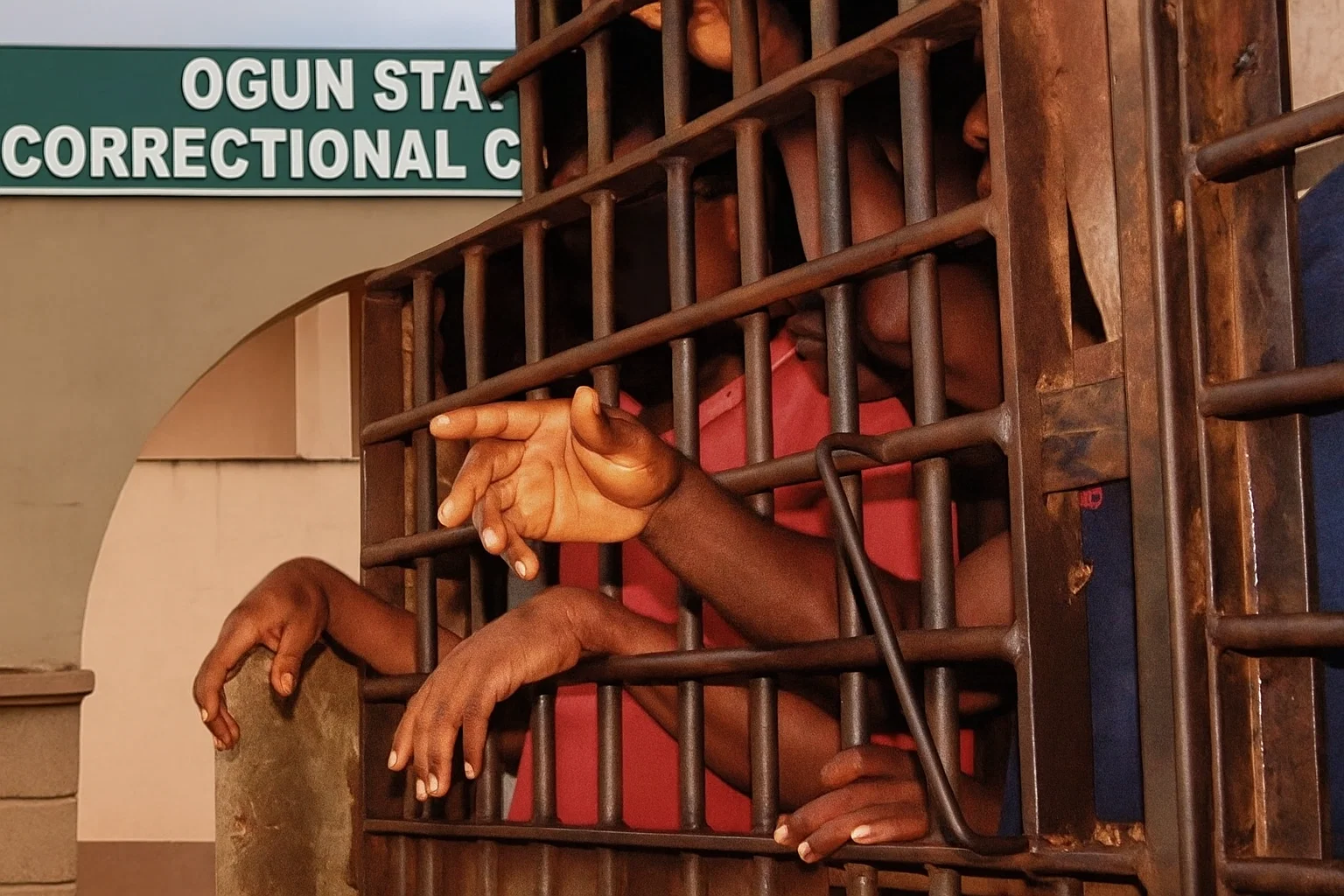LOCAL

“WE SLEEP LIKE SARDINES”: LIFE INSIDE OVERCROWDED OGUN PRISONS
"We slept like sardines—hundreds of us crammed into a cell built for just twenty. We battled everything from skin infections to lice, bedbugs, and even mental breakdowns,” recounted 50-year-old Idris (not his real name), as he shared his traumatic experience at the Ibara Correctional Centre in Abeokuta, Ogun State.
Idris's ordeal began one afternoon when he spotted an old friend near the Peoples Democratic Party (PDP) secretariat, across from the NNPC mega station in Abeokuta. Joyfully, he parked his car and went to greet him—unaware of the chaos that had unfolded the day before.
A violent cult clash had broken out, leading to a shootout. Idris was caught in the crossfire. “I was shot. I shot back at many, but I was outnumbered. My friend had already fled the scene. I sustained a neck injury and was taken to the Federal Medical Centre, Idi-Aba. After nearly a month, I was moved to Ibara Police Station, then Eleweran. Months later, I was charged in court with attempted murder and illegal possession of firearms,” he recalled.
Living Conditions Comparable to Hell
Idris spent nearly two years in prison as an awaiting trial inmate before being freed through the intervention of the Islamic Humanitarian Service (IHS). He described Ibara Correctional Centre as “hell on earth,” where his overcrowded cell was located beside the kitchen.
“I couldn’t believe it at first. I asked myself, ‘Is this where I’ll sleep tonight?’ But I ended up spending years there. The heat was unbearable day and night. It was so overcrowded—like sardines in a tin. We suffered mental distress, skin diseases, lice, and bedbugs,” he said.
He criticized the food as inadequate and unfit for human consumption. “What they gave us wouldn’t satisfy a child. Rice was served on Wednesdays and Saturdays; the rest of the time, it was beans and garri. If you ate too much of their watery soup, you risked developing health issues—we even had a slang for it: ‘Sapa ti mu mi lepon’, meaning hunger has shrunk my scrotum.”
An Overburdened System
The Nigerian Correctional Service (NCoS), formerly the Nigerian Prisons Service, was rebranded in 2019 under the Nigerian Correctional Service Act to prioritize rehabilitation over punishment. However, the reality tells a different story.
Correctional centres across the country remain overcrowded. As of 2025, they held 81,287 inmates—27,701 convicted and 53,178 awaiting trial. Of these, 79,193 are men and 2,006 women.
In Ogun State, the Ibara facility—designed to house 700—currently holds 1,468 inmates. The Oba Correctional Centre, built for 850, now shelters 999.
Idris also highlighted the lack of adequate medical care. “People died from untreated ulcers. I was lucky to survive mine. Most times, all you’re given is paracetamol. If it’s severe, your family must pay for treatment. I remember two inmates who went insane after contracting measles,” he said.
Breeding Grounds for Crime
The overcrowded and underfunded facilities are doing more harm than good. According to findings, many inmates leave worse off than they entered—reoffending and becoming more dangerous.
“Prisons are now training grounds for hardened criminals,” Idris observed. “Some inmates are jailed over minor infractions—N1,000 or N5,000 cases—and end up learning worse crimes inside. Even some convicted of robbery continue orchestrating crimes from behind bars.”
He added, “Those in prison for serious crimes often care for the ones with lesser offenses. In return, they earn their loyalty—and when they leave, they become part of the same criminal network.”
Inmates Beg Government for Mercy
Ayomide Olagoke, another inmate at Ibara and a master’s degree holder in Banking and Finance, appealed to the Ogun State Government to address the congestion crisis. Speaking during his theology degree convocation inside the facility, Olagoke pleaded for more amnesty and pardon programs.
“We are reformed. We’ve left behind our past. The world is waiting for us to make a difference. But many here have been awaiting trial for seven to nine years. What becomes of their children? Some have been sentenced to life or are on death row. We need a second chance,” he said.
Judiciary Raises Alarm Over Deplorable Conditions
Ogun State Chief Judge, Justice Mosunmola Dipeolu, during a jail delivery exercise in Sagamu, also lamented the inhumane conditions. “Inmates can’t lie down—they sit or stand all day. It’s a health hazard,” she said.
She cited cases of inmates detained since 2013, still awaiting trial after more than a decade. She emphasized the urgent need to decongest the facilities.
Similarly, Ogun State Controller of Corrections, Abioye Adesina, admitted that the centers remain overcrowded despite periodic efforts. He urged Governor Dapo Abiodun to provide more operational vehicles to aid logistics.
Reforms Largely Theoretical – Legal Expert
Legal practitioner and Philomath University lecturer, Ogaga Ediru, criticized the lack of enforcement of the Nigerian Correctional Service Act.
Section 12 of the Act mandates that authorities act within three months once a facility exceeds its capacity. But Ediru noted that these rules are often ignored. “On paper, everything looks good, but in reality, correctional centers are still overwhelmed,” he said.
He warned that overcrowding worsens health conditions and food quality, and facilitates the spread of infectious diseases. According to him, true prison reform must include comprehensive legal, administrative, and judicial reforms.
A Call for Urgent Reform
Ediru blamed the judicial system's slow pace for much of the crisis. “Many inmates are held indefinitely for minor offenses. We need more judges and magistrates, updated laws, and stronger police investigative capacity. Criminal justice reform should be prioritized by both federal and state governments,” he said.
He concluded by urging a shift from custodial punishment to community service and non-custodial alternatives, in line with modern justice standards.
"This represents a significant development in our ongoing coverage of current events."— Editorial Board









